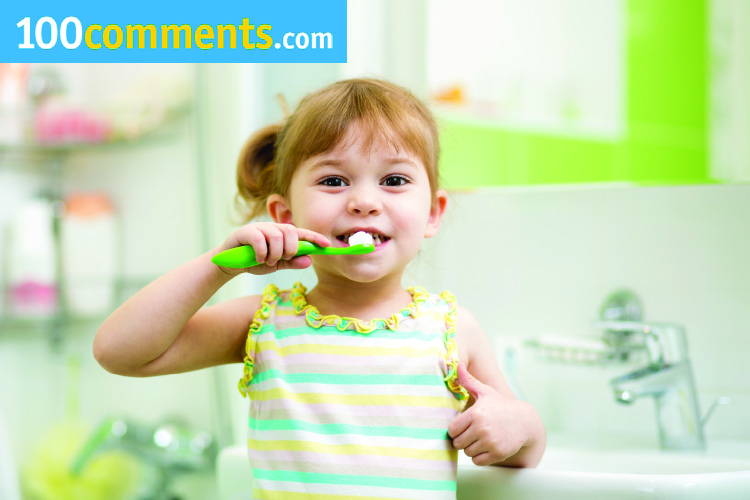Starting your toddler off with good dental care habits can help the little one keep a healthy set of teeth for decades to come. A baby’s primary teeth are already present in the jaws at birth. They begin cutting through the gums around six months and help set the stage for future smiles. Baby teeth function as space keepers in the jaw while waiting for adult teeth to arrive.
Table of Contents
Getting into the habit
Getting your toddler to clean his or her teeth should be daily routine, though you may need to be persistent. You can gradually give the little one more responsibility for the brushing as time goes on, but you’ll still need to supervise.
These tips will help:
- Clean your toddler’s teeth twice a day, including once before bed.
- Use a small toothbrush with soft, round-ended bristles of differing lengths, and a small, angled head.
- Use a smear of low-fluoride toothpaste for your toddler.
- Low-fluoride toothpastes contain about 1,000ppm (parts per million) of fluoride.
- Brush using small, circular movements.
- Concentrate on one section of teeth at a time, and don’t forget the backs. Make sure you clear all traces of food from on or between those little teeth.
- Encourage your toddler to spit out any excess toothpaste.
Persuasion is always better than force when it comes to forming good habits. Persuade your toddler into letting you help to brush his or her teeth regularly. If your little one is still reluctant, it may help to see you brush your teeth first.
Helping little teeth stay healthy
A good diet will go a long way in helping build strong teeth in toddlers. A lot of the foods and drinks that keep your toddler in good general health are also good for your little one’s teeth, so be sure to offer your child a balanced diet with plenty of fruit and vegetables.
Calcium will help your toddler grow strong bones and teeth. Dairy products such as cheese and milk are good sources of calcium. If your toddler doesn’t drink much milk, try other dairy products instead, such as yogurt or cheese. Leafy green vegetables, nuts and soya are also good sources of calcium.
You should also make sure your toddler’s diet contains plenty of vitamin D, which will help that little body to absorb more calcium. Good sources of vitamin D include eggs, oily fish and fortified foods such as breakfast cereals.
Foods or drinks to avoid
Sugar mixes with the bacteria in the mouth to make a mild acid which attacks the hard outer layer of our teeth, and can cause decay and cavities. A toddler who consumes lots of sugary food and drink will be continually topping up the levels of acid in his or her mouth. So try to keep sweets, cakes, chocolate and other high-sugar snacks to a minimum, especially between meals. This includes sugary or fizzy drinks, like juice or squash. Offer them as a treat instead.
By keeping your toddlers diet free from high-sugar foods and drinks for as long as possible, you will be giving those first little teeth a good start. Encourage instead, tooth-friendly snacks, such as vegetable sticks, fruit and yogurt.
While you don’t really have to ban sweet stuff from your toddler’s diet, you can instead reduce how often you offer them to your toddler. The more times a day your toddler eats something sugary, and the longer the sugar stays in the mouth, the more likely it is that damage will occur.
Wise tips
Restrict sugary food and drink to mealtimes, even if it’s homemade. A small slice of cake or a piece of chocolate to finish off a meal is less harmful to your toddler’s teeth than a lollipop to suck on all afternoon.
Sugary snacks, if offered, should be in one session rather than throughout the day. Afterwards, give your little one a small piece of hard cheese to neutralise the sugars, and make that teeth-brushing takes place regularly before bedtime.
Flouride varnish
When there is an increased risk of decay, or early signs of decay, your dentist may consider a treatment of fluoride varnish. The dentist paints this varnish on to your child’s teeth to stop the process of decay, or at least delay potential fillings. Talk to your dentist to find out if your child would benefit from this treatment.
Dentist visits
Has your toddler been to a dentist yet? If not, it’s a good idea to book an appointment. Most first teeth have nearly a decade of hard work in front of them. Good oral care, including attention and care of a dentist early on will lay the foundations for a lifetime of healthy teeth.
Dentists can help to prevent, as well as cure, teeth problems. So don’t wait until you see signs of tooth decay or until you think your toddler’s teeth needs help before taking your child to see a dentist. Also, taking your toddler to the dentist from a young age will help get the little one used to the environment of a dentist’s office. Taking your child to your own appointments will help too.
Make the visit fun and positive, even if you aren’t a fan of the dentist yourself. Dentists have lots of experience at making children feel welcome and comfortable. They may even offer your toddler a little reward at the end of the appointment!
Protecting your toddler’s teeth
Fluoride strengthens tooth enamel and helps to resist decay. Some children are particularly prone to tooth decay, and dentists sometimes recommend fluoride supplements as well as fluoride toothpaste. Always ask your dentist for advice before giving your toddler fluoride supplements.
















